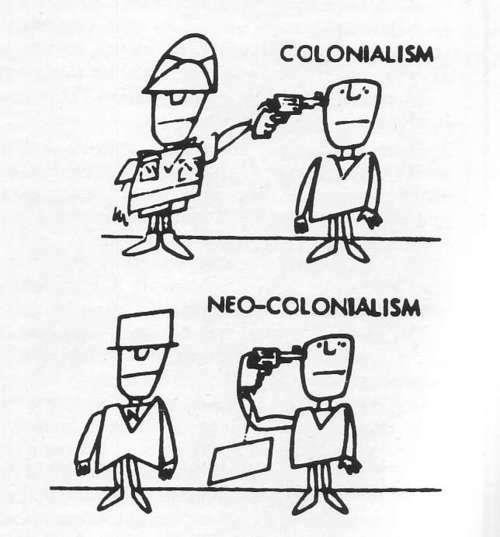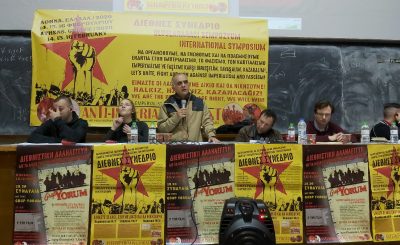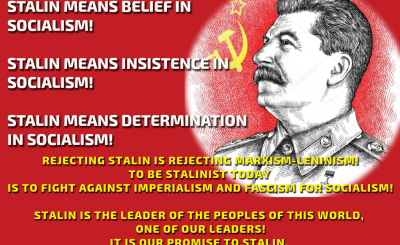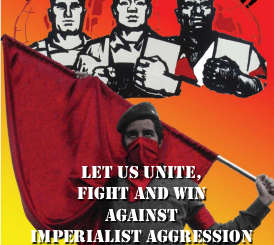The collapse of the Soviet Union and the overthrow of socialism in Eastern Europe represented a major shift in the balance of class forces on a world scale in favour of imperialism and its allies. This counter-revolutionary wave dealt a serious blow to the world’s revolutionary forces, and resulted in disorientation, defeatism and capitulation in many organisations, parties and movements claiming to fight for socialism and national liberation.
The bourgeoisie seized on these developments, claiming that their victory was total. They claimed that this was the end of history: the final and definitive defeat of socialism. The collapse of the Soviet Union, they argued, proved the superiority of capitalism as an economic system. All attempts to find a progressive alternative to capitalism and liberal democracy are futile, they claimed. Humanity faces a future of prosperity, democracy and peace.
But the new world order has turned out differently from these predictions. The fall of the Soviet Union removed a major obstacle to imperialist aggression, but in the new situation inter-imperialist rivalries have once again come to the fore. Far from there being a “peace dividend”, the world has become more violent, with imperialist sponsored civil wars and naked imperialist aggression. On the economic front, superexploitation of the masses in the oppressed countries has increased sharply. Within the imperialist countries themselves, there is an offensive against the working class under the slogans of labour market flexibility, casualisation, deregulation and lean production. This all adds up to the same thing: an increase in the rate of exploitation and an intensification of the class struggle.
Within the imperialist centres, the role of social democracy as the main social prop of the bourgeoisie has become even clearer. In Britain, Tony Blair’s New Labour continues the policies of the previous government, attacking the working class on all fronts. In the new world order, even the pretence of socialism is dropped: New Labour is openly pro- capitalist and anti-trade union. Its declared goal is to make British capitalism more efficient.
In the past, most left wing militants in Britain supported Labour, either because they were the lesser of two evils, or because they felt that the masses had illusions in Labour being a party for socialism. But under Blair’s leadership, it is impossible to claim this and retain credibility. No-one voted for Tony Blair because they thought this was socialism: they voted for him either because they just hated the old government, or because they believed New Labour was better for capitalism.
Blair has created a dilemma for the left: either for the Labour Party and against the working class, or for the working class and against the Labour Party. Unfortunately, many do not want to face up to this situation, and continue to support Labour “critically”. The fascists in Britain are posing as a radical alternative to the present system. By continuing to support Labour instead of trying to lead the struggle against Labour, the left is helping the fascist to achieve their goal. Already, in some working class areas, the fascists have stronger support among white workers than the left does. This is one reason why militant anti-fascism – fighting fascism ideologically and physically – is such an important part of the struggle today.
The Communist movement in Britain is very weak. The Communist Party of Great Britain, founded in 1921, no longer exists. It was dissolved, and changed into a left-liberal group – Democratic Left. But the truth is that the Communist Party was communist only in name for many years. Even before Khrushchov seized power in the Soviet Union, the Communist Party in Britain was revisionist. It adopted a peaceful, parliamentary road to socialism in 1945, when instead of looking to revolution it called for a government of national unity, embracing all the capitalist parties with Communist Party support. In 1951 it adopted its programme, The British Road to Socialism, which saw socialism coming through the election of a series of Labour governments.
There are many groups which call themselves Communist. Some also call themselves parties. But in truth, most of these groups are leftwing social democrats. They do not support revolutionary violence. They do not support those who struggle against British imperialism. In many cases, they did not even support the heroic struggles of the Liverpool Dockers against the employers, the government, and the union bosses. The genuinely revolutionary forces are also divided, and suffer from sectarianism. Trying to overcome disunity to build a genuine Communist Party is our main goal.
One positive development in Britain has been the creation of the Socialist Labour Party, led by the miners leader Arthur Scargill. This party has a leftwing social democratic ideology, but it stands for the class struggle in defence of workers rights, and recognises that to defend the workers today means to break the law. This makes them more left wing than many groups which call themselves Communist. However, the working class here – just like in every country – needs its own party, made up of the best militants from the working class, a Marxist-Leninist party whose goal is to organise the workers insurrection which will overthrow the bourgeoisie.
Though the forces of Communism and revolution are weak in Britain, elsewhere in the world the tide of revolution is rising. In Turkey, in the Philippines, in Peru, in Mexico, there are armed Communists fighting against imperialism and its local agents. Their struggle is an inspiration to us. They are the leading forces in the world revolutionary movement today. They have much to teach the communists in the west. In the former socialist countries, Communist movements are beginning to form and grow again, overcoming past mistakes, and taking their place at the forefront of popular struggles against the naked brutal capitalism that is being forced upon them. They, too, can play an important role in the world revolutionary process.
Engels once wrote that defeated armies learn well. They have no choice. After the defeats we have suffered internationally, the world proletarian army must learn from its defeats if it is to recover its strength. In some countries, these lessons have already be learned well. In others, like Britain, this is taking more time, but there, too, the lessons will be learned and the revolutionary movement will be rebuilt.
The disappearance of the former Soviet bloc and Albania provides us with the possibility of re-examining many of the things which have divided revolutionaries over the years. If we are committed to revolution, it is possible for us to overcome our differences on a principled basis. Links between communists and revolutionaries of different countries can help this process of reappraisal, regroupment, and regeneration.
We have to rescue the revolutionary core of Marxism-Leninism from a thousand revisionist and sectarian distortions.
We have to reject definitively the idea that there can be a peaceful road to socialism. As Marx wrote so many years ago, the weapon of criticism cannot replace the criticism of weapons. Violence is the midwife of history. Only the organised revolutionary violence of the oppressed and exploited masses can destroy capitalism and lay the foundation for the advance to socialism and communism.
We have to reject the idea that we can defeat imperialism by negotiations and abandoning the revolutionary struggle. Wherever this road has been taken – in Guatemala, in El Salvador, in South Africa, in Palestine – it is imperialism and capitalism which emerge as the victors, and the oppressed and exploited masses who are the losers. We must learn from Che, from Ho Chi Minh, from Mao, from Stalin. Imperialism can never be defeated without the armed struggle.
We have to counter the bourgeois conception of history, where the great achievements of socialism and the revolutionary movement are dismissed and denied. We have to reclaim our history. We have to counter the lies of the bourgeoisie, and defend the honour of the revolutionary movement. We have to defend and explain to ordinary workers the gains that socialism brought. Nor is this simply a matter of past victories: a vital part of our work today is to explain the real gains that socialism has brought to the Cuban people, and to stand firm with the Cuban people in defence of these gains against imperialist aggression, just as we stand with the people against imperialist aggression throughout the world.
In many ways, we have to return to basics: to the science of proletarian revolution, the need to smash the bourgeois state, the need for a united, disciplined proletarian party, the need for proletarian internationalism. But we need to do so in a way which enables us to carry forward the struggle in our own countries, charting out a path to revolution in our own concrete conditions.
And above all we need to be revolutionaries in deeds, and not only in words. Ever since the 1950s and 1960s, there have been communist groups in Britain which talk about armed revolution and criticised revisionism. But we need to put theory into practice. Indeed, the greatest form of revisionism is when communists talk about revolution, but do not put their words into action.
In public the imperialists are triumphant. But in private they are still haunted by the spectre of revolution. In private discussions, the Nato leaders see the next century as a century of uprisings. This is their nightmare, and our dream. Our task is to make that dream a realit.




